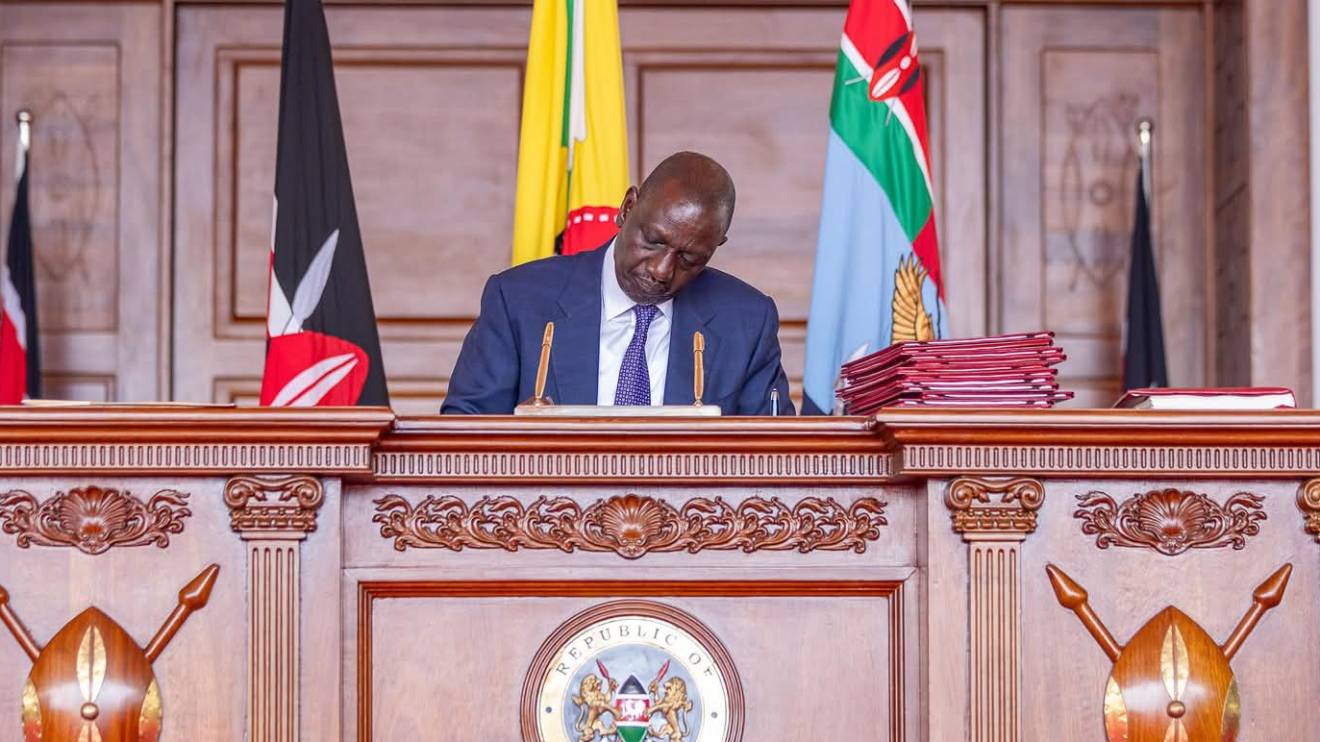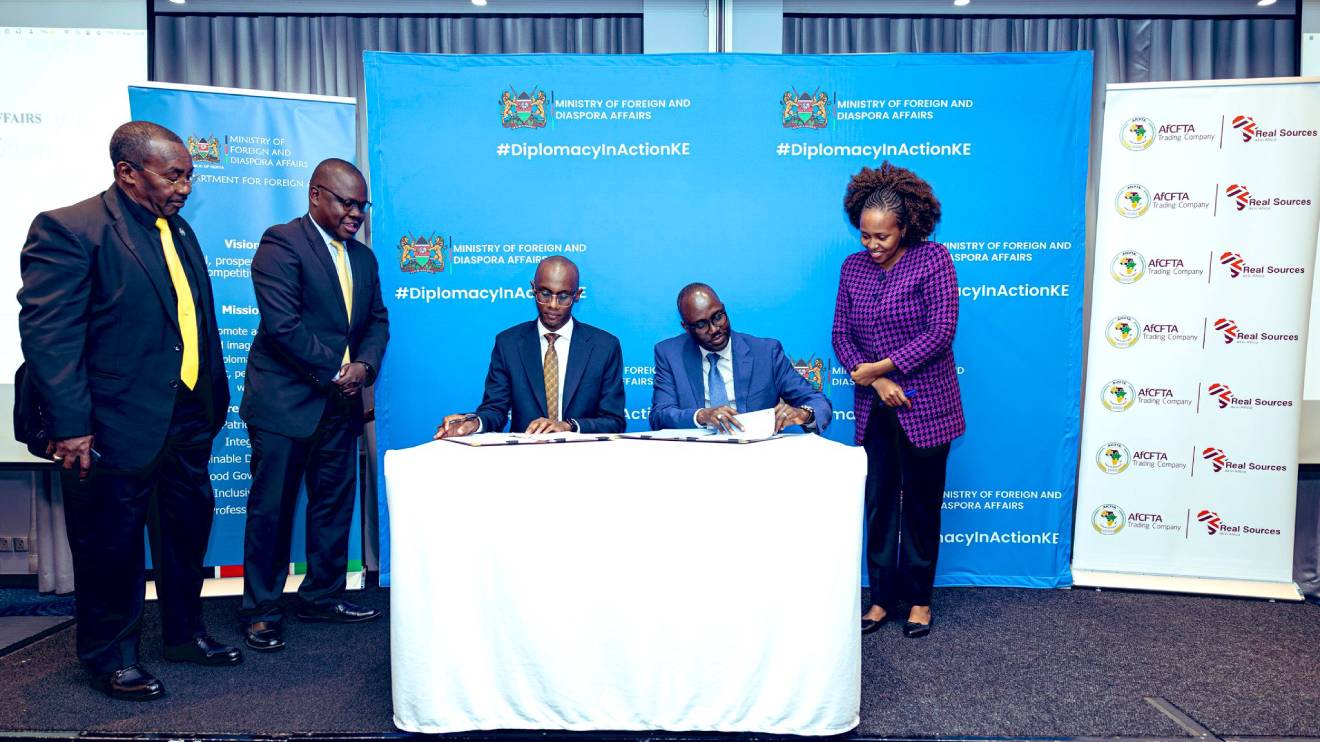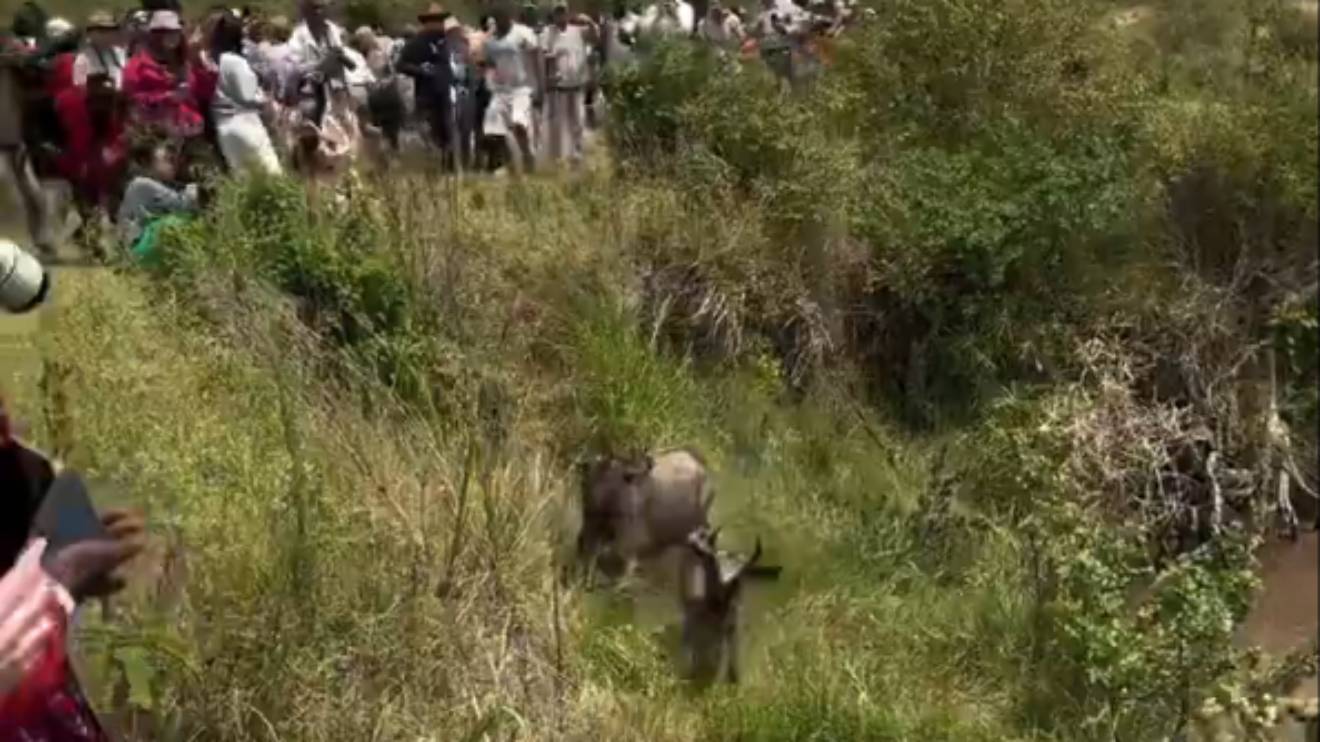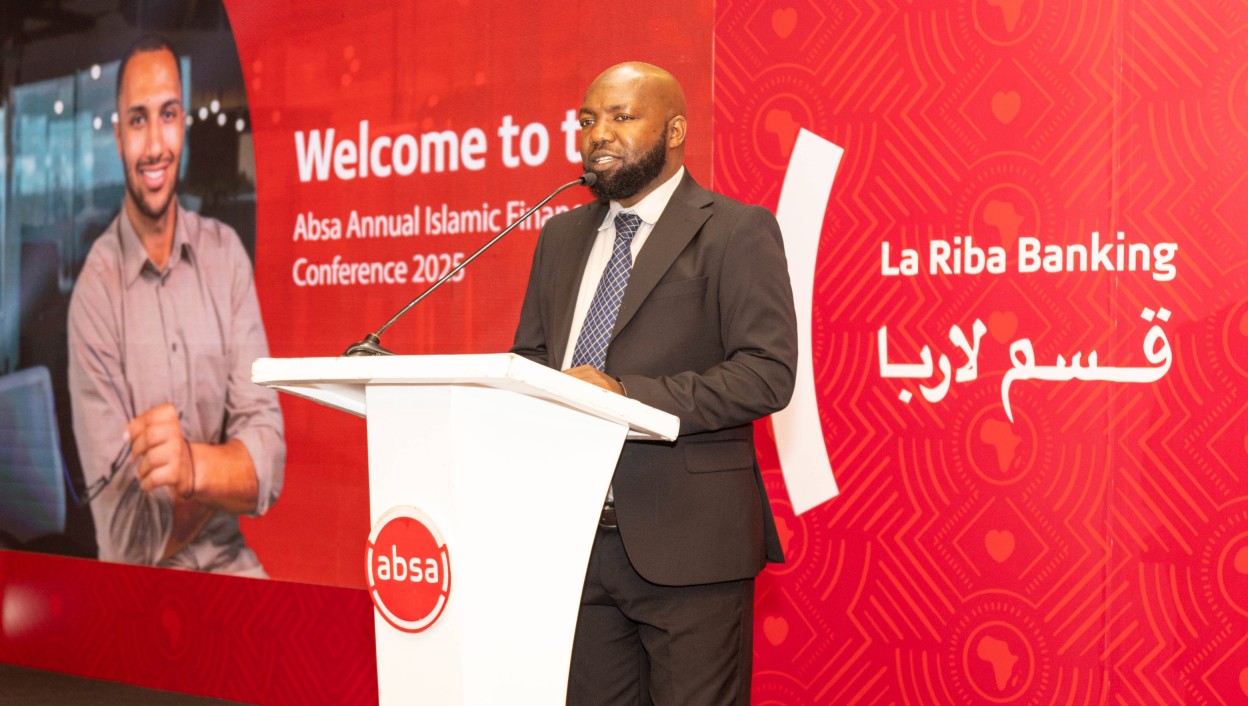MAY 1ST, 2023
UHURU GARDENS, NAIROBI
REMARKS BY HIS EXCELLENCY WILLIAM SAMOEI RUTO, PhD., C.G.H., PRESIDENT OF THE REPUBLIC OF KENYA AND COMMANDER -IN-CHIEF OF THE DEFENCE FORCES DURING THE 58th LABOUR DAY CELEBRATION
Distinguished Workers,
Kenyans,
Read More
1. I am happy to join our national workers’ movement in commemorating the International Workers’ Day, Labour Day. Traditionally, this day has been an important event in our national calendar, not only because Kenya’s workers have kept the engine of our economy running throughout the life of this nation, but also because to a profound extent, our workers’ unions and their membership contributed bravely to Kenya’s successful struggle for sovereign nationhood.
2. Kenyan workers and union leaders are among the courageous freedom fighters who sacrificed immensely to awaken in our people a deep consciousness of their aspiration for independence and led the struggle from the front until we finally became a sovereign state. During this time, the same workers dutifully performed their work in various sectors, keeping the economy moving forward. This is why and how we became both sovereign and competitive as a nation.
3. Since the birth of our Republic, Kenya has not stopped moving forward. We have grown continuously and become a global, continental and regional hub, a diversified and highly competitive economy, and a nation looking to the future with confidence that we can work our way to our destiny and achieve shared prosperity for our generation and beyond.
4. Today, then, we celebrate workers. We appreciate their contribution, which is fundamental to the progress we have made and to our prospects for posterity.
5. It is in recognition of this role of the worker -every person engaged in honest toil- that we have committed to deliver radical socioeconomic transformation that will ensure that every worker receives a continuous, significant and sustainable increase in the return to their labour, benefits from affordable livelihood, robust social protection and universal health coverage, has the option to live in and own affordable, decent housing and can therefore save more to invest and grow wealth.
6. Our entire Bottom-Up Economic Transformation Agenda is based on enhancing the productivity of labour. The commitment to increase agricultural and agro-industrial production, productivity and competitiveness, the growth of MSMEs, deliver millions of new affordable housing units and stimulate an explosion of the digital economy are all aimed at creating employment for tens of millions of Kenyans and simultaneously increasing their earnings.
7. Majority of Kenyan workers are engaged in the informal sector, and many of them are self-employed in micro-enterprises and small hustles. The kinyozi, mama mboga, boda boda artisan, technician, open-air traders and other hustlers struggle daily under difficult conditions, in an effort to provide for their families and improve their livelihoods. We have embarked on an intervention to make it easier for these workers to pursue their aspirations and to empower them to do more and grow their hustles.
8. The Hustler Fund is our primary vehicle for implementing the financial inclusion of small-scale informal sector workers and entrepreneurs. We have already made a provision of KSh.50 billion to lend to this category of workers, and so far, the response has been tremendous. A total of Ksh.27.6 billion has been borrowed, Ksh.17.6 billion repaid and Ksh.1.4 billion saved.
9. To further empower agents of economic growth beyond their labour, we are committed to enhance social protection by promoting greater savings, better retirement benefits, financial provisions for the elderly, widows and the disabled.
10. I understand that many workers often fall ill or get injured or are often called upon to provide care and pay for the treatment and other support of sick family members. The costs of these eventualities are steep and can trap many workers in poverty despite their hard work. To relieve workers of the burden of medical expenditures, the government has embarked on measures to implement a universal health cover that will keep the cost of medical treatment away from workers’ wages.
11. Fundamentally, the Bottom-Up Economic Transformation Agenda recognizes that Kenya is a nation of workers, and that every worker matters, and every occupation counts: Kazi ni Kazi. Consequently, it is our intention to implement policy and strategic measures to get more workers into paid employment, ensure that all labour pays fairly, and that workers are able to save, invest and grow their wealth. The scale of our transformational undertaking is historic and as we have demonstrated, we are fully committed to successful delivery.
12. It can be said with accuracy, then, that our Bottom-Up Economic Transformation Agenda is worker-centric: we have staked our vision on the expansion of our workforce and the empowerment of workers as the vehicle to shared prosperity and well-being.
13. I encourage our workers to sharpen their skills and increase their productive capacity and incomes by pursuing vocational education and training opportunities. The government has made these opportunities available throughout the country and they are very affordable to the average worker.
14. I also urge workers to mobilise into chamas and Saccos in order to create capacity to save, borrow from such funds as the Hustler Fund and invest in such opportunities as the affordable housing programme. We are proposing that all government employees contribute 3% of their salary to the Housing Fund so that they can own decent and affordable homes.
15. The Government is committed to the realization of the right to decent and adequate housing as articulated in Article 43 of the Constitution, where we as Kenyans ascribe to ourselves the right to housing that gives us a sense of safety, security, dignity, and contributes to us having a quality of life that promotes health and wellbeing.
16. We have set an ambition to bridge the gap in the housing deficit of 200,000 housing units annually specifically targeted to the lower income housing segment in a financing and delivery framework that attracts private sector funding.
17. The Housing Fund, in which the government has allocated Ksh.1 billion in this financial year, is important for workers in the lower income segments who face extraordinary challenges with accessing home financing. Through the Housing Fund, we will be able to offer financing products that are cheap and stable to match the size of everyone’s pocket.
18. In addition, Ksh.5 billion has been set aside in the upcoming financial year. This is a participatory measure for which Government employees seeking to own a home can opt-in and we will match their savings.
19. Similarly, we extend an invitation to other employers whose employees have an interest in owning affordable homes to follow suit as we fulfill our obligation in line with section 31 of the Employment Act that obligates every employer to provide housing to all its employees close to where they work.
20. The second measure is on voluntary contributions that allows those who are self-employed and in the informal sector who form the majority of our work force, a a path to home ownership. To date, the Voluntary contributions have been driving the program since inception with over Kshs.2 billion already saved.
21. To achieve the dream of affordable housing, the Government is subsidizing the program by providing land at no cost to the home owners, offering tax incentives such as vat exemption on all input materials such as steel and cement and also made stamp duty exempt for all first time home owners. In addition, the government has a facility in place with the World Bank and Africa Development Bank that will allow home owners with a single digit interest rate loan to be repaid over long term through the Kenya Mortgage Refinance Company.
22. The housing agenda is about creating real income generation and wealth creation opportunities for workers. Housing development has a very long supply chain ranging from steel, cement, sockets all the way to nails.
23. In all the projects we have launched, we are ensuring that MSMEs and Jua Kali Associations are providing inputs that will be used in the construction of homes. This allows us to give our workers an income that will pay for these homes we are building.
24. We are availing these opportunities for all industrialists, jua kali artisans and hardworking Kenyans like Ochieng the carpenter at our Rongai Housing scheme as well as other affirmative action groups such as Build Her Women Fundis in the recently launched Starehe Affordable Housing project, and Youth groups such as Mutarakwa Youth Housing Co-operative from Kariobangi currently engaged at Shauri Moyo Housing Scheme an opportunity to be part of this program.
25. As we continue to work hard, pursue opportunities and build our nation, it is my desire that every Kenyan worker registers themselves and their family for health coverage through the National Health Insurance Fund and for social protection and retirement benefits through the National Social Security Fund. I want to obtain an assurance from the Secretary-General of the Central Organisation of Trade Unions that all workers in the country will be facilitated to benefit from these programmes.
26. I wish to take some time to emphasise the significance of our decision to implement a new policy in connection to contributions to NSSF. We must strengthen and sustain a robust national savings culture, as a matter of urgency. Let us unite in agreement that it is time to make old age poverty a thing of the past. We must do everything necessary to protect this and future generations from hardship and indignity at the end of their working years. At the moment, we are not doing well in terms of old age poverty; in fact, we are ranked at number 72 out of 96 countries in the Global Age Watch Index, and the implications of this situation are unacceptable.
27. In addition, we have embarked on the process leading to the reform of the Work Injury Compensations legal framework. The current compensation model based on employer liability must be transformed into a social insurance system in the form of a Workers Compensation Fund to ensure sustainability. Once again, the Attorney General has instructions to proceed with speed on this matter.
28. Additionally, the government is also making progress in connection with the core labour rights agenda. We are keen on fulfilling our international obligations in the domain of labour rights and welfare. In this regard, I take this opportunity to assure Kenyan workers that we shall ratify both the International Labour Organisation Convention Number 189 on Decent Work for Domestic Workers as well as number 190 on the Elimination of Violence and Harassment at the Workplace.
29. I therefore direct the Attorney General to liaise with concerned state departments and ensure that we conclude the process quickly and in full compliance with the Labour Institutions Act and the Treaty Making and Ratification Act.
30. Speaking of Labour Institutions, I understand that the term of the last National Labour Board expired last year. The board is critical as the government’s principal advisory organ and as a vital labour sector governance organisation.
To enable us expeditiously and effectively undertake the domestication of the above-mentioned international instruments, I direct the Attorney General and the concerned state departments to constitute the new National Labour Board.
31. The last item of intended reform to enhance worker welfare and labour interests in general, is the Wages and Remuneration Policy, which is before the Cabinet. We will expedite its adoption in order to reconfigure the national wage determination framework and ensure that it is responsive to the sustainability, productivity and cost of living in prescribing the national minimum wage. It will also rationalise the public and private sector wage differentials.
32. As we do our best to build our nation and grow its economy, I give you the assurance of the full support of your government. Let us walk this road of economic transformation agenda together and we will surely reach our destiny of success, development and prosperity.
33. In order to do this, I give the further assurance that work and enterprise will be protected and supported by the government. That extends to the provision of security and assurance of the safety of all places of work: fields, greenhouses, farms, factories, shops, offices, markets and every other public and private infrastructure and enterprise where work takes place. It is the constitutional right of every Kenyan to expect full protection of their life and property. It is therefore a fundamental obligation of the state to actualise this right and expectation.
34. Any disruption, attack or even the mere threat of it, will henceforth be met with the full strength of the state and the utmost extent of the law and due process. Our commitment to economic transformation is irreversible and
therefore, our tolerance to malicious attacks and destruction, reckless disruption and interference, is absolute zero. We shall no longer condone actions that injure people and drive Kenyans into poverty. We know what democracy looks like and we also know what human rights are. And we clearly understand that we are all equal as citizens and nobody’s rights are more important.
I wish you all a happy Labour Day. May God bless you and may God bless Kenya.
Labour Day Celebrations, Uhuru Gardens, Nairobi. https://t.co/y4LLWQJMus
— William Samoei Ruto, PhD (@WilliamsRuto) May 1, 2023

-1681286320.jpg)

-1756319289.jpg)






-1755100273.jpeg)
-1756474472.jpg)
